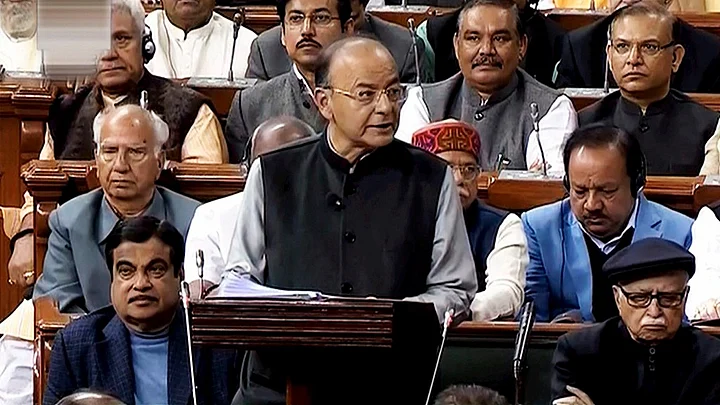Higher minimum support prices for crops and “Modicare” – an ambitious health insurance scheme that proposes to cover 10 crore households – may be the big ideas of Budget 2018 but they haven’t left Indian business leaders too impressed.
Their disappointment stems from the lack of a corporate tax rate cut for large businesses and few big growth levers that could help prompt a revival in private investment.
Speaking to BloombergQuint Adi Godrej, chairman of the Godrej Group, said it was not a growth inducing budget. Larsen and Toubro Ltd’s R Shankar Raman concurred that “none of the steps leave much for the private sector”.
M&M Ltd’s Pawan Goenka was more upbeat but agreed some measures amounted to incremental changes.
That said, corporates affirmed that the Union Budget, unveiled by Finance Minister Arun Jaitley in the Parliament on 1 February, was tilted towards the rural economy. Some argued that rural upliftment is the need of the hour, and will result in larger good.
Corporate consensus based on interactions with BloombergQuint remained that the corporate tax rate remaining unchanged at 30 percent for large corporations was disappointing. Additionally, the government’s decision to revoke the long-term capital gains tax on sale of listed securities after a year, was not called for either.
Adi Godrej, Chairman, Godrej Group
- The Union Budget was not a growth-inducing budget in Godrej’s opinion, as corporate tax on large companies did not get slashed, and the government reintroduced long-term capital gains tax on sale of listed equities.
- India cannot be a “competitive” market with the levy of a high corporate tax, as the US and UK governments have both reduced the rate.
- “If we are to attract investment, and if Indian companies have to compete across the world and in India we need to have a competitive tax rate,” he said.
- The government divestment number is “too small”, said Godrej, adding that there is a huge opportunity for divestiture in the country.
- There is no point for the government to hold stake in public sector companies anymore, added Godrej.
Rashesh Shah, President, FICCI
- The government did follow a ‘growth and consumption-oriented’ approach, said Shah. However, there should have been greater incentives and measures on the education front.
- Exports also did not get as good a boost in the budget as Shah expected. "The sector is poised for growth, if given a better boost,” he said.
- There was a strong focus on micro, small and medium enterprises due to which private investment in the sector will be encouraged, said Shah.
- The divestment target was too low, Shah added.
Pawan Goenka, Managing Director, M&M
- The thrust on research and development, which has been largely ignored for years, has been significant this time, said Goenka.
- Budget's focus on rural economy would lead to higher disposable income for farmers, leading to greater consumption and in turn investment.
- The biggest disappointment for Goenka was that nothing was done to reduce the corporate tax rate for large corporates. He said the US tax rate cut will impact India's competitiveness.
- The government’s decision to reintroduce long-term capital gains tax is "not unfair" said Goenka.
- The point of concern is that the difference between long-term and short-term is only 5 percent, and that might come in the way of government's target to increase tax collections, he added.
R Shankar Raman, CFO, L&T
- Application of funds and focus areas are ‘spot on’, he said, adding that the implementation of infrastructure development as promised would be a tough nut to crack.
- The private sector has been on the losing end, with “not much left in its hands, and capital taken from the sector instead by the levy of surcharge and cess,” he said.
- If India needs to move forward, the government does not have the balance sheet to fund it and “sectors which are in the money need to go forward and participate,” Raman said when asked if the taxation thrust of the Budget was more than India Inc had anticipated.
- The Budget proposals were “oriented towards a healthier India which could mean a re-election,” he concluded.
Vivek Karve, CFO, Marico
- The theme of the Union Budget was a "balancing act" for Karve.
- He said that the government's focus on agriculture, education, healthcare would result in greater employment generation and higher disposable income in the hands of consumers.
- Due to a rural economy-centric Budget, income inequality is likely to reduce, he said.
- The rich will sure have a reason to complain, he added.
VS Parthasarathy, Group CFO, M&M
- He said the budget is “FAR” sighted, with far being the acronym for farm, agriculture and rural economy, implying that rural economic growth was prioritised.
- The budget will be good from a rural viewpoint if government “allocations get converted into actuals,” he said.
- The reduction in corporate tax rate to 25 percent from 30 percent for companies with an annual turnover of upto Rs 250 crore is a good move, but could have been extended to larger companies as well, said Parthasarathy.
- The rural market is looking up, so while the budget has lost on the corporate side, it has gained on the rural end.
(This article has been published in an arrangement with BloombergQuint)
(At The Quint, we question everything. Play an active role in shaping our journalism by becoming a member today.)
